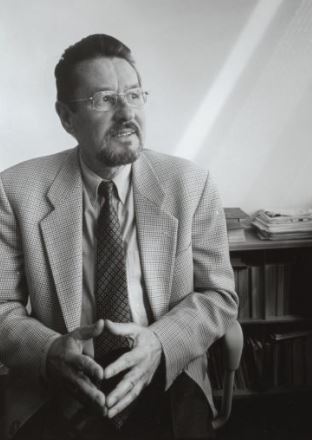Prof. Dr. Reinhard Wippler (1931-2020), one of the founders of the ICS Graduate School, passed away.

Reinhard Wippler was a Professor of Sociology (chair ‘Theoretical Sociology’) at the Faculty of Social and Behavioural Sciences of Utrecht University since 1971, becoming an emeritus in 1996. For 25 years, he led the Department of Sociology.
Scholar
Born in Leipzig, he moved from East to West Germany in 1951 and later to the Netherlands. Following a brief career in classical music (conservatorium Leipzig, Stuttgart, and Cologne, a violist at Südwestdeutsches Kammerorchester and Noordelijk Filharmonisch Orkest), he turned to sociology in 1957. At the University of Groningen, Ivan Gadourek, one of the founders of modern empirical sociology in the Netherlands and like Wippler a migrant from Eastern Europe, became his thesis advisor. Wippler’s 1968 cum laude PhD thesis on leisure behaviour (Determinanten van het vrijetijdsgedrag), concise and crystal clear, is an outstanding example of quantitative sociology and of Gadourek’s school. Subsequently, Wippler became a founder of explanatory sociology and of the ‘structural individualistic’ research programme in sociology, focusing on the integration of systematic theory formation, empirical research, and statistical modelling. Since the 1970s, this programme has been highly influential in the development of the discipline and has contributed to the internationally leading position of Dutch sociology.
Institution builder
An eminent scholar, Wippler was as well an institution builder par excellence. Under his leadership, the Department of Sociology of Utrecht University acquired a leading position in the Netherlands and internationally. In 1986, he became one of the founders of the Interuniversity Center for Social Science Theory and Methodology (ICS) at the universities of Utrecht and Groningen, later joined by sociologists from Nijmegen and meanwhile also by a group of sociologists at the University of Amsterdam. Building on a collaborative network of sociologists that Wippler had initiated already in the 1970s, the ICS soon became a paradigm for PhD training programs in the Netherlands, admired and emulated also outside the Netherlands. As an exemplar of a well-designed and well-functioning interuniversity research school, the ICS transformed sociology in the Netherlands, as can be easily inferred, for example, from the very large number of chair holders in sociology at many universities in the Netherlands (and beyond) who have been trained at the ICS.
Thesis advisor
Wippler was an advisor of 33 PhD students who successfully defended their theses. No less than 19 of his PhD students secured full professorships themselves. Reinhard was particularly proud of this element of his legacy.
Visiting appointments, honors
Having held visiting appointments and visiting professorships at Harvard, Berkeley, Erlangen-Nürnberg, Sciences Po Paris, and repeatedly at NIAS, Wippler, as a visiting professor, also contributed significantly to rebuilding sociology and the Sociology Department at Leipzig University, often returning to his hometown after the Wende in 1989. He received a royal decoration as Knight in the Order of the Netherlands Lion and the Honorary Medal (Erepenning) of the Faculty of Social and Behavioral Sciences in 1996. A liber amicorum and a volume with selected papers by Wippler likewise appeared in 1996, when he became an emeritus.
Sound standards
Sociology à la Reinhard Wippler is based on the willingness to accept the authority of the better argument as well as the authority of empirical evidence, with no other authorities in science as a cognitive system. This presupposes institutional arrangements of open societies as well as arrangements for science as a social system that foster the authority of arguments and empirical evidence. As his biography shows, Wippler strived for such arrangements with tenacity and with a keen eye for long-term developments. In the 1970s and 1980s, this was, put mildly, not completely uncontroversial at the Faculty of Social and Behavioural Sciences – and Wippler never shied away from controversy. Things started to change at our faculty in the early 1990s and meanwhile many of Wippler’s quality standards are undisputed – highlighting his long-term influence also on the social and behavioural sciences at his own university.
Emeritus
David Hume, the great philosopher of the Scottish Enlightenment, the intellectual movement that is the origin of various ideas on which sociology à la Reinhard Wippler builds, once wrote about old age in one of his letters: ‘Old age is but sorrow […] but extreme old age is certain misery […] may it be my fate […] to stop short at the threshold of old age, and not to enter too far into that dismal region’. Reinhard Wippler was somewhat lucky in this respect. He maintained broad intellectual interests, also following developments in his discipline from a distance, always available for colleagues and friends. For himself, he thus managed to push the threshold of ‘extreme old age’ quite a bit until deep into his eighties, entering the ‘dismal region’ only in his final two years or so, but definitely after his spouse Titia deceased some months ago.
Reinhard Wippler passed away on 17 September, at the age of 89. Sociology in the Netherlands, and not only here, has lost a mentor and leader.
This obituary (PDF), written by prof. dr. Werner Raub, has originally been prepared for the intranet of Social and Behavioural Sciences of Utrecht University
